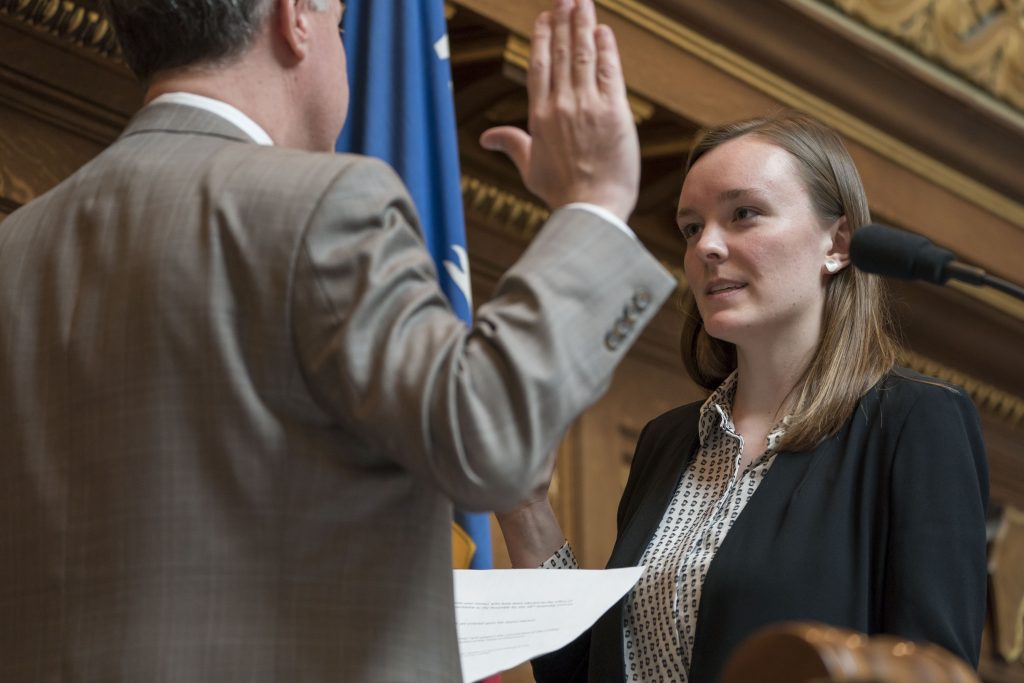Assembly Democrats Take The Long View
Youngest leadership team ever lays out its vision, hopes and concerns.
Long-serving Democrats in the Wisconsin Legislature have been making way this year for younger members to take the helm. Sen. Jon Erpenbach (D-West Point) and Senate Minority Leader Janet Bewley (D-Mason) are the latest to announce they won’t seek reelection. Former Assembly Minority Leader Gordon Hintz stepped down from his leadership post last month.
Brand-new Assembly Minority Leader Greta Neubauer (D-Racine) and Assistant Minority Leader Kalan Haywood (D- Milwaukee) answered reporters’ questions Tuesday at a virtual lunch hosted by WisPolitics.
“It’s pretty similar to the experience I had when I first ran for office four years ago — I was 26,” said Neubauer. “And when I knocked on people’s doors in Racine, what they often said to me was that I reminded them of their kids or their grandkids. … They hoped that with me, and other young people in office, we could build towards a Wisconsin where their family would really want to live and they would want to stay.” Among the commitments she made to her constituents at the time, she said, was to focus on investing in strong public schools, child care, public transit and climate-resilient infrastructure.
Admittedly, it is a difficult time to make progress on any of those priorities in the Legislature. In Wisconsin’s divided government, the Republican majority rarely allows Democratic bills to come to the floor for a vote, while Republican bills are often fated to meet Democratic Gov. Tony Evers’ veto pen.
Neubauer and Haywood say they are not daunted by the discouraging short-term picture, however.
“Our job… is to push the conversation,” Neubauer said.
“There are people who are turning 18 every year, and they are part of a new voting demographic that we have not yet tapped into,” he added.
The second Democratic woman and the first LGBTQ legislator to serve as minority leader, Neubauer said she hopes that her leadership role will inspire young people.
“What I hope it represents to people is that there’s a space for them in this work, that there’s an opportunity for them to engage no matter what their age.”
The Assembly’s young leaders, she added, bring a “long-term perspective.”
“That means that we are able to fight for Wisconsin not just for policies that will help us today or tomorrow,” she added, “but in the very long term.”
“As young leaders, as leaders in the caucus,” Haywood said “We, really have to be able to focus on how we build it to the future. How do we build that longevity and sustainability?”
For the coming elections, Neubauer laid out a pragmatic goal: shooting to win enough seats to prevent the Republicans from getting a veto-proof majority, so that Evers can continue to stop their agenda.
When she joined the Legislature’s Joint Finance Committee’s budget listening tour through rural Wisconsin, Neubauer said she heard voters express their adamant desire for better broadband access “a necessity, in this state, in 2022,” she said, adding, “We’re very lucky the [federal] infrastructure bill moved forward.”
She also heard many people express concerns about water quality, and said she found it heartbreaking to watch citizens who had suffered deteriorating health because of PFAS contamination in their drinking water coming to the Capitol “begging for us to do something,” only to see legislation addressing PFAS “stonewalled again and again.”
Climate change is a key issue for Neubauer, who sees the Legislature responding, piecemeal, to the environmental impacts on business and tourism, but still refusing to address the underlying causes of the climate crisis. As an example of the mounting, visible impacts of climate change on the state, she described having to change her route to reach a budget hearing in rural Wisconsin because of flooding.
Neubauer sounds determined, like many young climate activists who have been throwing themselves into their efforts to make change despite older generations’ indifference, to keep fighting against daunting odds.
Mayers asked Neubauer and Haywood to assess the state of the state In advance of next Tuesday’s address by Evers.
He and Neubauer both acknowledged the suffering brought about by the pandemic. “People are tired of making sacrifices,” said Neubauer. And they are tired of the uncertainty. What political leaders need to do now, she added, is to demonstrate the ways in which “government can be a force for good,” and plan for a post-pandemic reality.
On the subject of schools, where much of the uncertainty of the pandemic has been keenly felt, Neubauer went back to her budget tour of a year ago, where more than half of participants talked about their desire for more investment in public education. Evers’ budget proposal responded to Wisconsinites’ clear message that they want an increased investment in special education — a mandatory cost that has been funded at steadily lower levels, causing it to eat into all other school programs — as well as more spending on per-pupil aid and mental health.
“These are just some of the most important investments and policies we can pass in the next several months,” she said. “Our kids cannot wait any longer.” Teenagers especially have struggled a great deal during the pandemic with mental health crises, she noted.
Republican bills to expand vouchers, break up the Milwaukee public school district and punish schools that went virtual during the pandemic are not responsive to Wisconsinites’ real concerns, she added. “I’m glad Republicans feel the need to discuss education,” Neubauer said. But what Wisconsinites want is more investment, “not partisan efforts to break apart school districts or restrict funding for kids as part of a political game.”
Focusing on Milwaukee, Mayers asked Haywood what he makes of the effort to bring the Republican National Convention to the city in 2024, especially after the RNC called the violent insurrection at the Capitol on Jan. 6 “legitimate political discourse” — queueing up Haywood to take a swipe at the idea of a Milwaukee RNC. But Haywood didn’t bite. It’s all about economic development, he said, for any city that might get the chance to host a national convention. Haywood added that Republicans should consider their audience and promote an inclusive message in Milwaukee if they do hold the convention there. “If you’re going to come to a city like Milwaukee, do you truly have what the residents care about most in mind?” he said.
At the same time, he added, it’s the Democrats’ job to hold the Republicans accountable. “I think for us as Democrats, making sure we’re still engaged with the voters,” he said. “We are here for you. We understand what you’re going through. And we support you.”
Assembly Democratic leaders take the long view was originally published by the Wisconsin Examiner.























Seems like two racists considering that they have the nerve to keep poor children of color in our city out of voucher schools. Very sad that they would show their faces in public.